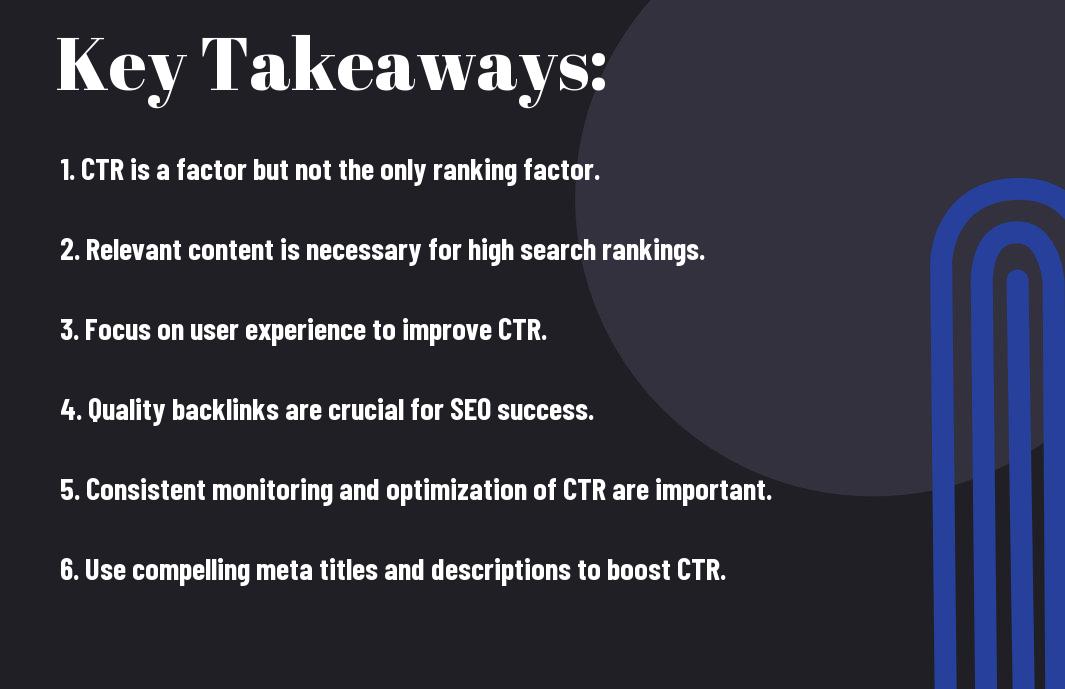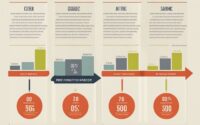Is Improving Your CTR The Key To Dominating Search Engine Rankings?
Concerning rankings on search engines, improving your Click-Through Rate (CTR) can play a crucial role in your website’s performance. By focusing on crafting compelling meta descriptions and titles that entice users to click through to your site, you can dominate the search engine results pages. A high CTR not only boosts your visibility but also tells search engines that your content is relevant and engaging, ultimately improving your ranking. Learn how optimizing your CTR can be the secret weapon to elevate your SEO strategy.
Key Takeaways:
- CTR is not the only factor: While a high click-through rate (CTR) is important for search engine rankings, it is not the only factor that determines your position in search results.
- Quality content is crucial: Search engines also prioritize high-quality, relevant content that meets the user’s search intent. Focus on creating valuable content for better rankings.
- CTR can impact rankings: Although not the sole determinant, a good CTR can definitely have a positive impact on your search engine rankings, especially if it indicates user engagement and satisfaction.
- Optimize meta tags: Crafting compelling meta titles and descriptions can improve your CTR by enticing users to click on your link in search results, ultimately boosting your rankings.
- User experience matters: Providing a seamless and user-friendly experience on your website can lead to higher CTR, longer dwell times, and improved rankings in search engines.
- Monitor and analyze data: Regularly track your CTR and user behavior data to identify areas for improvement and optimize your strategies for better search engine performance.
- Strive for a balanced approach: While CTR is important, it should be part of a comprehensive SEO strategy that includes various elements such as content quality, technical optimization, and user experience to achieve dominance in search engine rankings.

The Importance of CTR in Search Engine Rankings
How CTR Affects Your Website’s Visibility
To improve your website’s visibility and search engine rankings, you must pay attention to your Click-Through Rate (CTR). CTR is the percentage of users who click on your website’s link after seeing it in search results. Higher CTR indicates that your website is relevant and engaging to users, which search engines like Google prioritize in ranking websites. When users consistently click on your link, it signals to search engines that your content is valuable and should be shown to more people, potentially boosting your rankings.
The Role of CTR in Google’s Algorithm
Search engines like Google use complex algorithms to determine the relevance and quality of websites. CTR plays a crucial role in these algorithms because it directly reflects user engagement and satisfaction with your content. Google aims to provide the best user experience by displaying websites that users find useful. Therefore, a high CTR can positively impact your rankings, improving your website’s visibility in search results.
A higher CTR can lead to increased organic traffic and improved search engine rankings, making it necessary for you to optimize your title tags, meta descriptions, and website content to attract clicks. By focusing on improving your CTR, you can enhance your website’s performance in search results and ultimately dominate the rankings in your niche.

What Drives Click-Through Rates
The Power of Compelling Titles and Descriptions
The titles and meta descriptions of your web pages play a crucial role in driving click-through rates. An enticing title that promises valuable content can capture the attention of searchers and compel them to click on your link. Similarly, a well-crafted meta description provides a sneak peek into the page’s content, prompting users to learn more by clicking through to your site.
The Impact of URL Structures and Keywords
Drives the alignment of your URL structures and relevant keywords can significantly impact your click-through rates. By including targeted keywords in your URLs, you signal to search engines and users what the page is about, potentially improving your visibility in search results. Clear, concise URLs that mirror the page’s content make it easier for users to understand the relevance of your page, increasing the likelihood of them clicking on your link.
With a strategic approach to URL optimization, you can improve the user experience and enhance your search engine rankings. By incorporating relevant keywords into your URLs and structuring them in a logical manner, you make it easier for both users and search engines to navigate your site, increasing the chances of attracting organic traffic.
The Influence of Rich Snippets and Schema Markup
The use of rich snippets and schema markup can have a profound impact on your click-through rates. The enhanced presentation of your search listings with rich snippets, including star ratings, reviews, and other additional information, can make your result stand out from the competition. Rich snippets provide users with more context about your page, increasing the likelihood of them clicking through to your site for more detailed information.
Analyzing Your Current CTR Performance
Not sure where to start in improving your search engine rankings? It all begins with analyzing your current Click-Through Rate (CTR). Your CTR is a crucial metric that indicates how effective your search engine listings are at attracting clicks. By examining your CTR performance, you can identify areas for improvement and fine-tune your SEO strategy to achieve better results.
Identifying Areas for Improvement
Your first step in analyzing your current CTR performance is to identify areas where you can make enhancements. Look at which keywords or search queries are driving the most traffic to your site but have lower CTRs. By focusing on optimizing these specific keywords in your meta titles and descriptions, you can make your listings more compelling and enticing to users, ultimately boosting your CTR.
Using Google Search Console and Analytics Data
Performance data from Google Search Console and Google Analytics can provide valuable insights into your CTR performance. By analyzing this data, you can pinpoint which pages on your website have low CTRs and investigate the possible reasons behind it. Understanding user behavior, such as the devices they use or the demographics they belong to, can help you tailor your strategies to better target your audience and improve CTR.
The data from these platforms can also reveal the click-through rates for different search queries, giving you a clear picture of which keywords are driving the most traffic to your site and which ones may need optimization.
Setting Realistic Goals and Benchmarks
To truly dominate search engine rankings, you need to set realistic goals and benchmarks for your CTR improvement. **Setting realistic** targets based on your current performance can help keep you focused and motivated to achieve tangible results. By tracking your progress over time and comparing it to industry benchmarks, you can assess the effectiveness of your strategies and make necessary adjustments to continually improve your CTR performance.
**To** stay competitive in the ever-evolving landscape of SEO, it’s crucial to regularly evaluate and update your goals to align with the latest trends and algorithms. By setting achievable milestones and tracking your CTR improvements, you can position yourself as a frontrunner in search engine rankings and drive more organic traffic to your website.
Strategies to Improve Your CTR
Crafting Irresistible Title Tags and Meta Descriptions
Improve your click-through rate by crafting irresistible title tags and meta descriptions. These elements are often the first thing users see when browsing search engine results. Make sure your titles are captivating, relevant, and include keywords that match user intent. Similarly, meta descriptions should provide a brief and compelling summary of your page content to entice users to click through.
Optimizing Your URL Structures for Better CTR
Your URL structure also plays a crucial role in attracting clicks. Keep your URLs concise, descriptive, and easily readable. Including relevant keywords in your URLs can help users and search engines understand the content of your page at a glance, increasing the likelihood of click-throughs.
URL structures that are messy, long, or nonsensical can deter users from clicking on your link, even if your content is valuable. A clean and organized URL structure not only improves CTR but also enhances the overall user experience on your website.
Leveraging Rich Snippets and Schema Markup
One effective strategy to boost your CTR is by leveraging rich snippets and schema markup. Rich snippets provide users with additional information directly in the search results, such as star ratings, product prices, or upcoming event dates. By implementing schema markup on your website, you can help search engines understand your content better and display rich snippets, making your listings more visually appealing and clickable.
Another benefit of utilizing rich snippets and schema markup is that it can improve your website’s visibility in search results and establish credibility with users. When users see enhanced search listings with rich snippets, they are more likely to perceive your website as a reputable source of information, leading to increased click-through rates.
Enhancing Your Brand’s Online Presence
With the rise of digital marketing, enhancing your brand’s online presence is crucial for improving CTR. Consistent branding across all online platforms, engaging with your audience through social media, and actively managing online reviews can all contribute to a stronger brand presence. When users recognize and trust your brand, they are more inclined to click on your search results, driving up your CTR and ultimately improving your search engine rankings.

The Connection Between CTR and Conversion Rates
How CTR Impacts Your Conversion Funnel
The click-through rate (CTR) of your search engine results plays a crucial role in determining the traffic that lands on your website. However, it’s crucial to understand that getting users to click on your link is just the first step in the conversion process. Converting these visitors into actual customers depends on the user experience, the relevance of your landing page, and the value proposition you offer.
Strategies to Boost Conversions Through CTR Optimization
The key to increasing conversions through CTR optimization lies in crafting compelling meta titles and descriptions that entice users to click. Strategies such as A/B testing different ad copy, using relevant keywords, and implementing schema markup to enhance your search listings can significantly impact your CTR. Furthermore, ensuring that your landing pages align with the user’s search intent and provide a seamless browsing experience can lead to higher conversion rates.
On top of that, incorporating persuasive call-to-action buttons and leveraging social proof elements like testimonials and reviews can further enhance your chances of converting visitors into customers.
Measuring the ROI of CTR Improvement Efforts
To determine the return on investment (ROI) of your CTR improvement efforts, you can track metrics such as the increase in organic traffic, keyword ranking improvements, and most importantly, the actual increase in conversions on your website. Tools like Google Analytics can provide valuable insights into the performance of your pages and help you attribute conversions back to your CTR optimization strategies.
Measuring the ROI of your CTR improvement efforts allows you to identify which tactics are most effective in driving conversions and adjust your strategies accordingly to maximize your marketing efforts.
Common Mistakes to Avoid in CTR Optimization
Over-Optimizing for Keywords
Avoid falling into the trap of over-optimizing your content for specific keywords in an attempt to boost your click-through rate (CTR). While keywords are vital for SEO, stuffing your content with too many keywords can make it sound unnatural and spammy. This not only turns off users but can also lead search engines to penalize your website for keyword stuffing.
Ignoring Mobile-Friendliness and Page Speed
MobileFriendlinessIn today’s mobile-first world, **ignoring mobile-friendliness and page speed can be detrimental to your CTR and search engine rankings**. If your website is not optimized for mobile devices or if it loads slowly, **you risk losing potential visitors who will bounce back to search results**. Search engines prioritize mobile-friendly and fast-loading sites, so **failing to address these issues can hurt your overall online visibility**.
Common signs of a website lacking in mobile-friendliness and page speed optimization include** slow loading times, distorted images or text on mobile devices, and difficult navigation on smartphones and tablets**. To improve your CTR and SEO performance, focus on optimizing your website for mobile usability and speed.
Failing to Test and Refine Your Approach
Avoid the mistake of assuming that a single CTR optimization strategy will work perfectly for your website. **To truly dominate search engine rankings, you need to continuously test and refine your approach**. Different tactics work for different industries and audiences, so **experimenting with various methods will help you determine what resonates best with your target audience**.
TestRegularly **monitoring your CTR metrics, conducting A/B tests, and analyzing the results** will allow you to make data-driven decisions and **fine-tune your CTR optimization strategy for maximum impact**.
To wrap up
Taking this into account, while improving your click-through rate (CTR) can have a positive impact on your search engine rankings, it should not be the sole focus of your SEO strategy. It is crucial to remember that search engines use a variety of factors to determine rankings, and while CTR is important, it is just one piece of the puzzle. To dominate search engine rankings, you must also focus on creating high-quality, relevant content, optimizing your website for keywords, building backlinks, and providing a great user experience.
By incorporating CTR optimization into your overall SEO strategy and continuously refining your tactics based on data and analytics, you can increase your chances of ranking higher in search engine results. Remember that SEO is a long-term game, and consistent effort and a holistic approach are key to achieving sustainable success in the ever-evolving digital landscape.
FAQ
Q: Is improving your click-through rate (CTR) important for dominating search engine rankings?
A: Yes, improving your CTR can have a significant impact on your search engine rankings. Higher CTR indicates that users find your content relevant and engaging, which search engines take into consideration when ranking websites.
Q: How can I improve my CTR?
A: To improve your CTR, you can focus on creating compelling meta titles and descriptions that accurately reflect the content of your page. You can also use schema markup to enhance how your page appears in search results, and regularly update your content to keep it fresh and relevant.
Q: Is it true that a high CTR alone can guarantee a top search engine ranking?
A: While a high CTR is important, it is not the only factor that determines search engine rankings. Search engines like Google consider numerous other factors such as content quality, relevance, backlinks, and user experience in their ranking algorithms.
Q: Can a low CTR negatively impact my search engine rankings?
A: Yes, a consistently low CTR can potentially lower your search engine rankings. It may indicate to search engines that your content is not resonating with users, leading to a decrease in visibility and traffic to your website.
Q: How can I track and monitor my CTR performance?
A: You can track and monitor your CTR performance using tools like Google Search Console and Google Analytics. These tools provide insights into your website’s click-through rates, search queries driving traffic to your site, and areas for improvement to boost your CTR.


